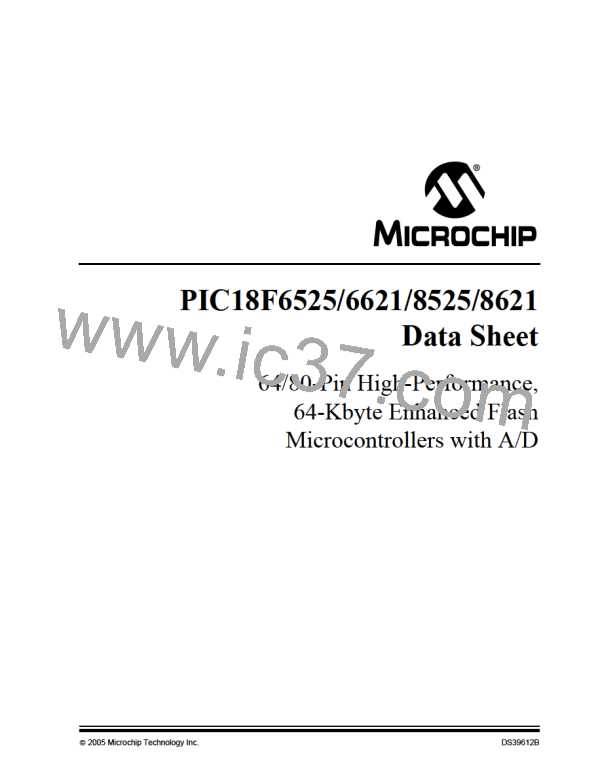PIC18F6525/6621/8525/8621
A fetch cycle begins with the Program Counter (PC)
incrementing in Q1.
4.6
Instruction Flow/Pipelining
An “Instruction Cycle” consists of four Q cycles (Q1,
Q2, Q3 and Q4). The instruction fetch and execute are
pipelined such that fetch takes one instruction cycle,
while decode and execute take another instruction
cycle. However, due to the pipelining, each instruction
effectively executes in one cycle. If an instruction
causes the program counter to change (e.g., GOTO),
then two cycles are required to complete the instruction
(Example 4-2).
In the execution cycle, the fetched instruction is latched
into the “Instruction Register” (IR) in cycle Q1. This
instruction is then decoded and executed during the
Q2, Q3 and Q4 cycles. Data memory is read during Q2
(operand read) and written during Q4 (destination
write).
EXAMPLE 4-2:
INSTRUCTION PIPELINE FLOW
TCY0
TCY1
TCY2
TCY3
TCY4
TCY5
1. MOVLW 55h
2. MOVWF PORTB
3. BRA SUB_1
Fetch 1
Execute 1
Fetch 2
Execute 2
Fetch 3
Execute 3
Fetch 4
4. BSF
PORTA, BIT3 (Forced NOP)
Flush (NOP)
5. Instruction @ address SUB_1
Fetch SUB_1 Execute SUB_1
All instructions are single-cycle except for any program branches. These take two cycles since the fetch instruction
is “flushed” from the pipeline, while the new instruction is being fetched and then executed.
word boundaries, the data contained in the instruction
4.7
Instructions in Program Memory
is a word address. The word address is written to
PC<20:1> which accesses the desired byte address in
program memory. Instruction #2 in Figure 4-6 shows
how the instruction “GOTO 000006h” is encoded in the
program memory. Program branch instructions, which
encode a relative address offset, operate in the same
manner. The offset value stored in a branch instruction
represents the number of single-word instructions that
the PC will be offset by. Section 25.0 “Instruction Set
Summary” provides further details of the instruction
set.
The program memory is addressed in bytes. Instruc-
tions are stored as two bytes or four bytes in program
memory. The Least Significant Byte of an instruction
word is always stored in a program memory location
with an even address (LSB = 0). Figure 4-6 shows an
example of how instruction words are stored in the pro-
gram memory. To maintain alignment with instruction
boundaries, the PC increments in steps of 2 and the
LSB will always read ‘0’ (see Section 4.4 “PCL,
PCLATH and PCLATU”).
The CALL and GOTO instructions have an absolute
program memory address embedded into the
instruction. Since instructions are always stored on
FIGURE 4-6:
INSTRUCTIONS IN PROGRAM MEMORY
Word Address
LSB = 1
LSB = 0
↓
Program Memory
Byte Locations →
000000h
000002h
000004h
000006h
000008h
00000Ah
00000Ch
00000Eh
000010h
000012h
000014h
Instruction 1:
Instruction 2:
MOVLW
GOTO
055h
000006h
0Fh
EFh
F0h
C1h
F4h
55h
03h
00h
23h
56h
Instruction 3:
MOVFF
123h, 456h
2005 Microchip Technology Inc.
DS39612B-page 45

 MICROCHIP [ MICROCHIP ]
MICROCHIP [ MICROCHIP ]